The International Center for Agricultural Research in the Dry Areas (ICARDA) requested that crop seeds from a backup vault in Norway be transported to its headquarters in Beirut, Lebanon, . The ICARDA requested the seed varieties to replace those lost from its previous headquarters in Aleppo, Syria, during the country’s civil war. The transfer is the first withdrawal in history from the Svalbard Global Seed Vault, published by its governing organization, the Global Crop Diversity Trust.
First opened in 2008, the Svalbard vault was designed to protect the greatest possible variety of seeds for crops that are crucial for human survival. The vault has safeguards to protect it from rising sea levels and power loss and the capability to remain sealed and frozen in the event of a disaster for a minimum of 200 years.
“If something were to happen to one of those collections around the world, they can always come back to the seed vault and retrieve what might have been lost,” Brian Lainoff, a spokesperson for the Crop Trust, said in the release.
Installed into the side of a mountain 800 miles from the North Pole, the underground Norwegian vault functions as a last-resort seed bank for about 860,000 seed samples from almost every nation on earth. The ICARDA requested 130 boxes, containing a total of 116,000 samples of seeds, of the 325 boxes it stores in the vault, according to Reuters.
“Protecting the world’s biodiversity in this manner is precisely the purpose of the Svalbard Global Seed Vault,” Lainoff told Reuters.


